News
From May 21 to May 31, 2019, the "China-Latin America and Caribbean Region Legal Professionals Exchange Program" hosted by the China Law Society, undertaken by Shanghai Law Society and Shanghai University of Finance and Economics, was successfully held at Shanghai University of Finance and Economics. The program aims to implement the "China-Latin American and Caribbean Cooperation Plan (2015-2019)" and promote the spirit of the second ministerial conference of China-CELAC Forum, strengthen exchanges and cooperation between the legal profession of China, Latin American and Caribbean countries, stimulate high-quality co-construction of the Belt and Road Initiative and advance practical exchanges and cooperation in fields of economy, trade and law between China and Latin America.
The participants of the seminar consisted of more than 20 eminent legal professionals from 15 Latin American and Caribbean countries, including Argentina, Barbados, Bolivia, Brazil, Chile, Colombia, Costa Rica, Cuba, Dominica, Ecuador, Guyana, Mexico, Peru, Trinidad and Tobago, Venezuela, etc. Their professions range from government legal officials, judges and prosecutors to scholars and lawyers.
On the morning of May 22, 2019, the opening ceremony of the program was held at Shanghai University of Finance and Economics. Zhang Mingqi, Vice President and Secretary-General of the China Law Society, Ding Shan, Counselor of the Department of Latin American Affairs of the Ministry of Foreign Affairs, He Pinwei, Vice President of Shanghai Law Society and Director of Shanghai Municipal Committee of the CPPCC Social and Legal Committee, Xu Tao, Party Secretary of SUFE, and Ignacio Concha, Consul General of Chile in Shanghai, attended the opening ceremony and delivered speeches. Zheng Shaohua, Assistant to the president of SUFE and Director of the China-Latin America Legal Research Center, hosted the opening ceremony. Consul General of Argentina in Shanghai Oparo, Consul General of Cuba in Shanghai Nestor Torres Oliveira, Consul of Brazil in Shanghai Pan Xin, Deputy Consul of Ecuador in Shanghai Mauricio Miranda Chavez and other guests and participants of the seminar along with the representatives of teachers and students from SUFE Law School attended the opening ceremony.


The program which lasted for ten days invited domestic senior legal experts to offer 12 lectures.
Zhang Mingqi, Vice President and Secretary-General of the China Law Society, President of the China Law Society Social Law Studies Institute, lectured on "China's Employment System Legislations and Regulations". The course covered the establishment and balanced operation of labor relations, the settlement of labor disputes, labor dispatch employment and the innovative development of China's labor law system.
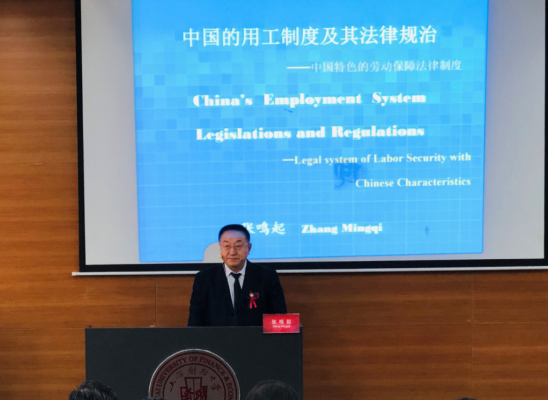
Zhang Naigen, distinguished professor and doctoral supervisor of international law of Fudan University Law School, and Vice President of Chinese Society of International Law, gave a lecture on "The Construction of International Law from the Perspective of a Community with a Shared Future for Mankind". The lecture introduced the concept of a community with a shared future for mankind and emphasized the leading role of advanced concepts in the construction of modern international law system. It discussed the relationship between the perspective of international law principles and the institutionalization of a community with a shared future for mankind, as well as the five principles of a community with a shared future for mankind and the five principles of peaceful coexistence.
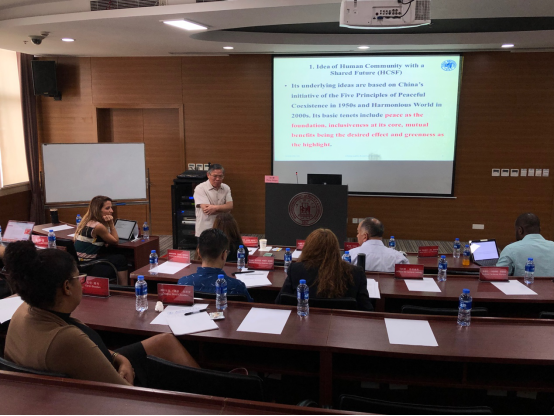
Professor Guan Baoying, a famous jurist who is responsible for Shanghai's key discipline "Administrative Law", lectured on "Chinese Judicial System". Starting from the composition of China's national institutions, the lecture discussed in details our country's present judicial reform and future judicial development of justice principles and the judicial system.
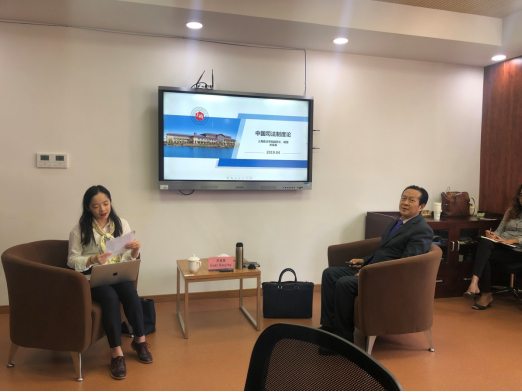
Professor Song Jie, Deputy Dean of Zhejiang Gongshang University Law School and Deputy Director of the Institute of International Law, lectured on "Interpretation of China’s International Criminal Justice Assistance Law". He introduced the goals, principles and competent authorities of the law, and discussed the conditions required for the criminal justice assistance that foreign governments may request the Chinese government to offer (such as investigation, evidence collection, recovery of criminal proceeds, etc.), as well as the reasons why criminal justice assistance may be rejected. In the end, he gave his views on the development of the law.
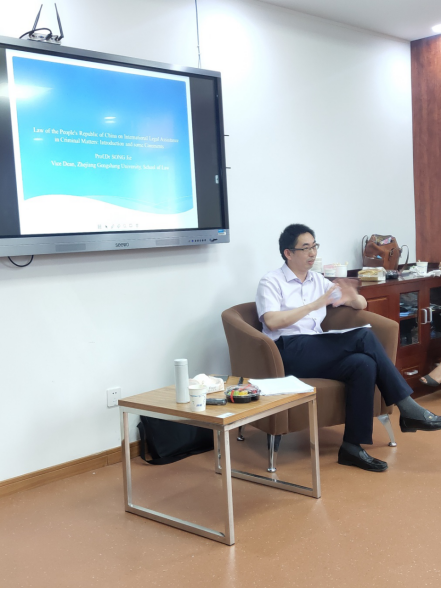
Professor Qian Yeliu, discipline leader of criminal law of East China Normal University Law School, gave a lecture on "Recent Developments of Chinese Criminal Law". Starting from the "Criminal Law of the People's Republic of China", he introduced the goals, principles, styles and typical charges in the specific provisions of criminal law. He also discussed the development characteristics of Chinese criminal law, such as placing great emphasis on the protection of human rights, strengthening the crackdown on new types of crimes and corruption crimes, etc. Finally, he put forward his views on the development of Chinese criminal law and prediction for its future development trend.
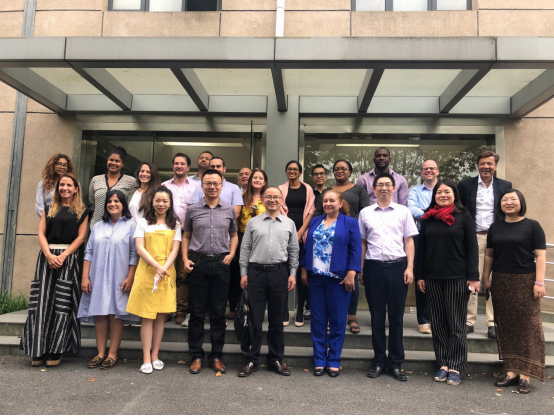
Shi Junming, Senior Partner at Dentons Law Firm, post-doctorate in law, lectured on "The Research and Practice of the Belt and Road International Commercial Dispute Settlement Mechanism". Starting from the basic information of the Belt and Road, he talked about the current situation and policies of China's foreign investment, as well as considerations that affected companies’ foreign investment. At the end of the lecture, he discussed the impact of the Belt and Road policy on trade and investment between countries and its solutions, combining with relevant specific cases.
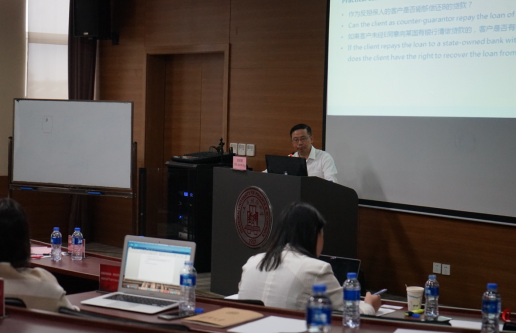
Sun Xinhua, Director of Shanghai Foreign Investment Development Board, gave a lecture on "Interpretation of China's Foreign Investment Law". Starting from the situation of attracting and utilizing foreign investment in Shanghai, he discussed the establishment and improvement of China’s foreign investment legal system, and also analyzed the relevant major points of China’s foreign investment law.
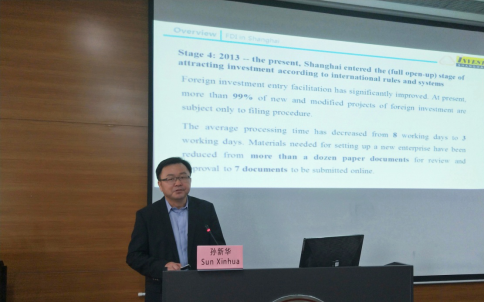
Professor Song Xiaoyan, Dean of Shanghai University of Finance and Economics Law School, lectured on "Legal Issues in International Trade of China". Firstly, she listed the laws and treaties related to China's international trade. Secondly, she talked about the 9 principles of the World Trade Organization and relevant conclusions. Then she introduced the status quo of China's international trade. Finally, she discussed China Pilot Free Trade Zone and the new Foreign Investment Law.
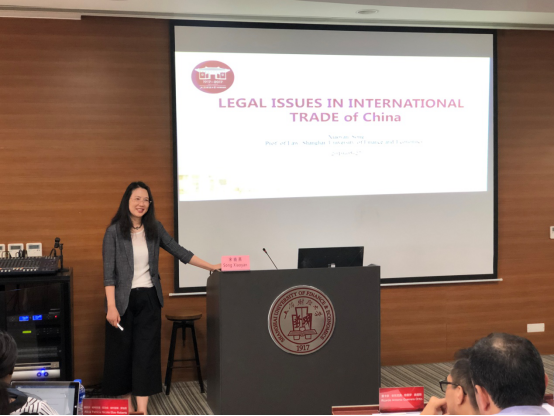
Professor Ge Weijun, Deputy Dean of Shanghai University of Finance and Economics Law School, lectured on "Chinese Company Law". First, he briefly introduced the formulating background of Chinese Company Law. Then he talked about the characteristics and types of Chinese companies. Combining with the typical cases in the field of the company law, he discussed with the participants about some hot issues such as registered capital subscription system, corporate social responsibility, and charitable donations.
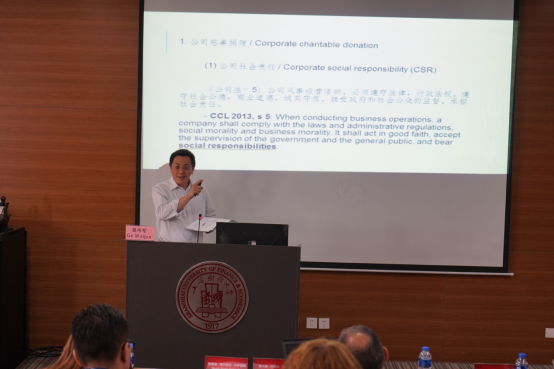
Wang Jinling from SUFE gave a lecture on "The History and Future of Chinese Intellectual Property Law". Starting from the key issues of intellectual property law revision, she talked about the principles of law revision, the history of China’s intellectual property law revision, the improvement of future trademark protection, and the future improvement of the patent law and the copyright law. Finally, she introduced the relevant laws on knowledge protection in international law.
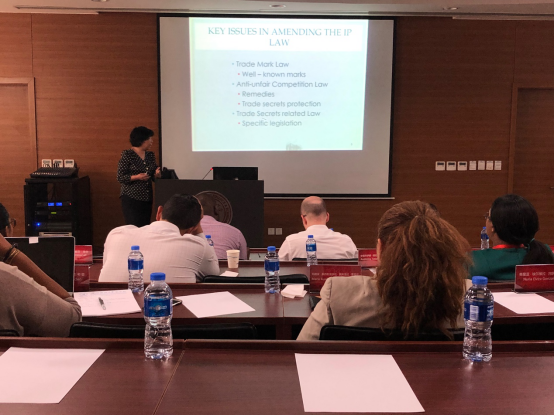
Liu Yang from SUFE gave a lecture on "The Compilation of the Chinese Civil Code". From the compilation background, he discussed the political, economic, and cultural reasons behind it. He also analyzed the purpose of the compilation, and sorted out the structure of the Civil Code and current compilation situation. Finally, he summarized the direction and tasks of the compilation of the Chinese Civil Code in the future.
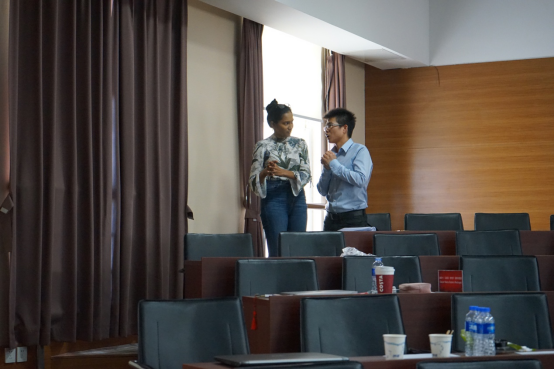
He Huan from SUFE Law School lectured on "Chinese Bankruptcy Reorganization System". First, he led the participants to scan the basics of China's bankruptcy law. Then he introduced the reorganization process and commercial operations involved combining with typical bankruptcy cases. Finally, he discussed some issues like the submission procedures of the reorganization plan and the procedures of confirming the reorganization facts.

The 12 lectures let the participants get a preliminary knowledge of the basic Chinese law system, China’s foreign trade law system and the new achievement of Chinese democracy and rule by law construction. The vigorous debate between the participants, experts and professors in class deepened the participants’ understanding of the legal systems in different countries.
After class the seminar organized the participants to visit local practice department such as judicial authorities, arbitration organization and well-known law firms. During the visit, meetings were held to promote in-depth exchange.
On the morning of May 24, the participants of the seminar arrived at Shanghai No. 1 Intermediate People's Court for visit and exchange. Before the symposium, the participants visited the Legal Culture Corridor of Shanghai No. 1 Intermediate People’s Court accompanied by Dean Huang Xiangqing, which allowed them to know partial history of the development of Chinese and foreign legal systems. They also visited various courts and got to know the procedure of court judgement. When the symposium started, Dean Huang Xiangqing introduced the basic information of Shanghai No. 1 Intermediate People’s Court to the participants. Cheng Yang, President of the commercial court, provided an overview of our country's court system and civil litigation system. Jin Hui, Director of the Information Management Center, introduced the concrete application of information technology in the court. The participants showed a lively interest in that. They asked questions about China’s jury system, the application of guiding cases in trial practice, the characteristics of litigation and arbitration, the professional demand of judges, and the promotion role of information construction in quality and efficiency of trials. All of these questions were answered. The participants praised the Chinese courts’ achievements in promoting judicial transparency, improving the quality and efficiency of trials, and ensuring judicial fair.
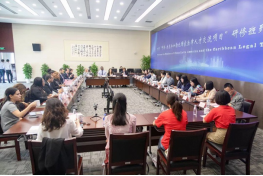
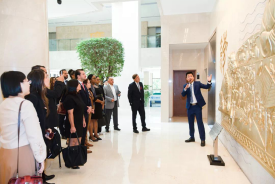
On the morning of May 28, the participants of the seminar visited Shanghai International Economic and Trade Arbitration Commission. Du Lijun, Head of Public Affairs of Shanghai International Economic and Trade Arbitration Commission, introduced the basic situation of the arbitration commission. Xu Suosheng, a staff of Shanghai International Economic and Trade Arbitration Commission, introduced how to arbitrate in China, incumbent mediators and arbitrators of the committee, the arbitration procedure, the cost of arbitration, and the implementation of arbitration awards. The participants raised a series of questions about the job requirements for arbitrators, the collection of arbitration fees, the job transition between lawyers and arbitrators, the process and time required for the arbitration procedures, and the differences in adjudication procedures between arbitration committee and court. The staff of Shanghai CIETAC arbitration department answered all the questions. In the end, the participants were showed around the office space of Shanghai CIETAC by the staff.
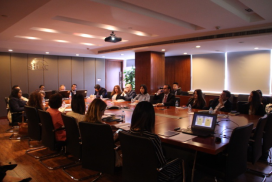
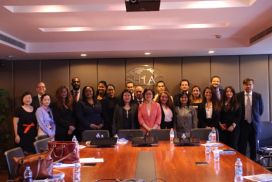
On the afternoon of May 28, the participants of the seminar went to Beijing Dentons (Shanghai) Law Firm for a forum. Chen Feng, Director of the law firm, along with some partners and a number of professional lawyers participated in the meeting. The participants raised questions about the impact of trade disputes between China and the United States on the foreign businesses of Chinese local law firms. Their questions received responses from the director, partners, and lawyers. With Chinese companies going global came the growth in foreign business. Subsequently, the participants expressed interest in the development of the firm's business in Latin America and Caribbean region. Director Chen also said that a series of cooperation will be carried out in the coming years. Besides, the participants exchanged ideas with Dentons on issues related to the Chinese legal service market, the protection of client information in China, the qualifications of lawyers, law firm cooperation, and foreign merger of Dentons.


In addition, the seminar also arranged for the participants to visit China (Shanghai) Pilot Free Trade Zone, Yu Garden, Shanghai City Planning Exhibition Hall, Zhujiajiao Ancient Town and Shanghai Museum. Overwhelmed by a dazzling array of cultural relics and artworks, as well as the infection of local customs, the participants experienced the profoundness and extensiveness of Chinese culture.
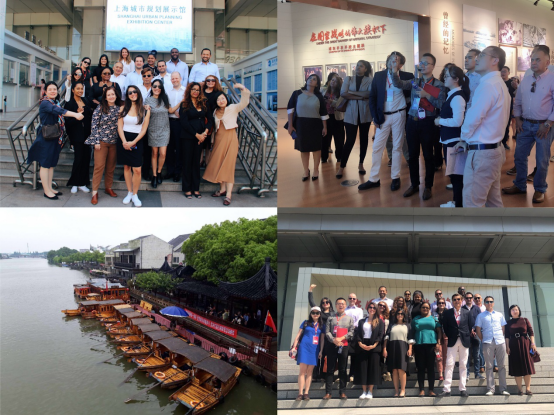
On the afternoon of May 30, the graduation ceremony of China-Latin America "Belt and Road" Seminar on Rule of Law Cooperation and China-Latin America and Caribbean Region Legal Professionals Exchange Program was ceremoniously held at Shanghai University of Finance and Economics. Deputy Director of the International Liaison Department of the China Law Society (in charge of work) and Full-time Vice President of Shanghai Law Society Shi Weidong, Member of the Standing Committee of the CPC Committee of Shanghai University of Finance and Economics, Minister of the United Front Work Department and Director of China-Latin America Legal Training Base Zhou Jiepu, Dean of Shanghai University of Finance and Economics Law School Professor Song Xiaoyan, Party Secretary of Shanghai University of Finance and Economics Law School Yang Le, Deputy Party Secretary of Shanghai University of Finance and Economics Law School Luo Shanhong, lawyers and scholars from Shanghai Yingming Law Firm, Beijing DHH (Shanghai) Law Firm, Shanghai University of International Business and Economics Law School, the International Law School of East China University of Political Science and Law, and Shanghai University of Finance and Economics, as well as the participants attended the seminar and the graduation ceremony. The participants discussed two topics with a number of senior professors and lawyers. The two topics were research on legal issues of China-Latin America “Belt and Road” financial cooperation and security and legal protection of trade and investment facilitation from the perspective of China-Latin America judicial reform. Finally, Shanghai University of Finance and Economics Law School signed a memorandum of cooperation with representatives of some countries and institutions.
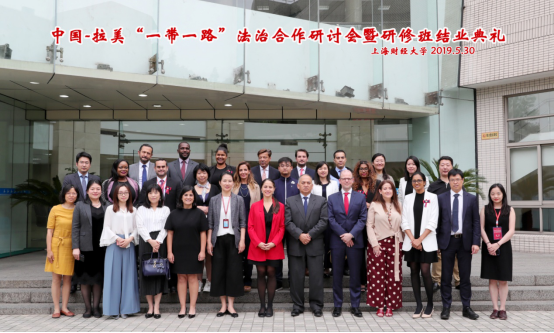
The ten-day learning and exchange made the participants develop an increased understanding of many legal fields in China, promoted China-Latin America rule of law exchange and also strengthened the China-Latin America friendships. It is believed that with the smooth progress of China-Latin America "Belt and Road" cooperation, China-Latin America economic and trade cooperation will gradually get better. It is hoped that the holding of the program will enable both parties to build consensus on the legal system, expand cooperation ideas, and release cooperation potential. The program is an extension and development of China-Latin America Legal Forum. Since the establishment of the forum, China-Latin America legal community has always maintained a strong desire for cooperation and enthusiasm for participation. We hope that such enthusiasm will continue.
Contributed by: Chen Qian; Hu Baoyue; Xu Ziwen
Photograph: Chen Qian; Hu Baoyue; Xu Ziwen

© 2012 School of Law, Shanghai University of Finance and Economics


 沪公网安备31011002001712号
沪公网安备31011002001712号